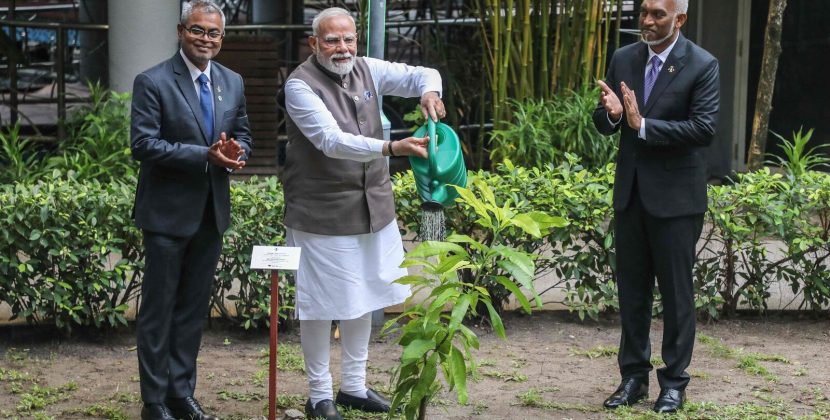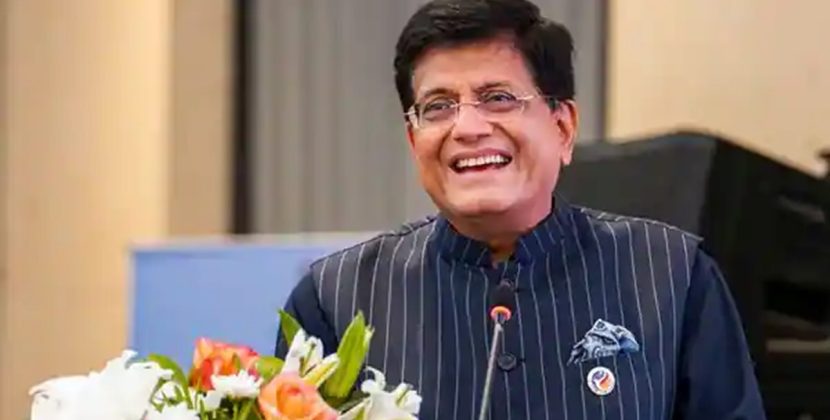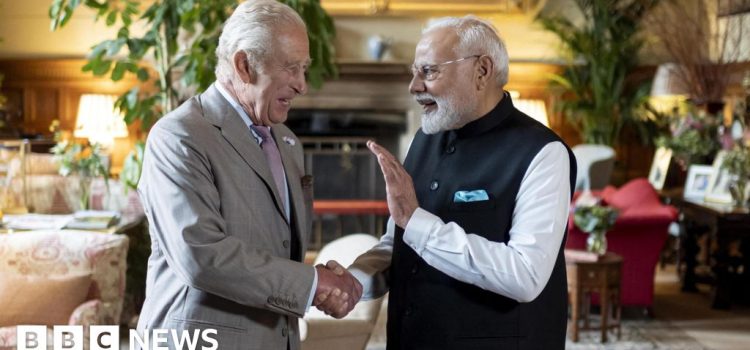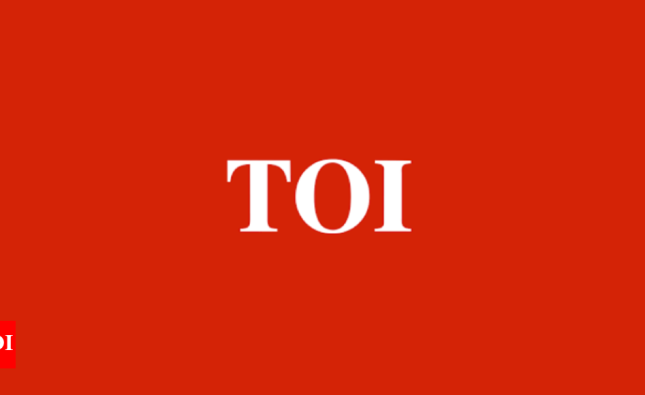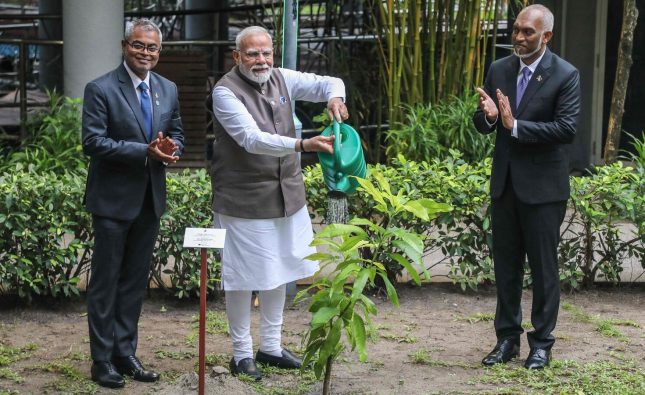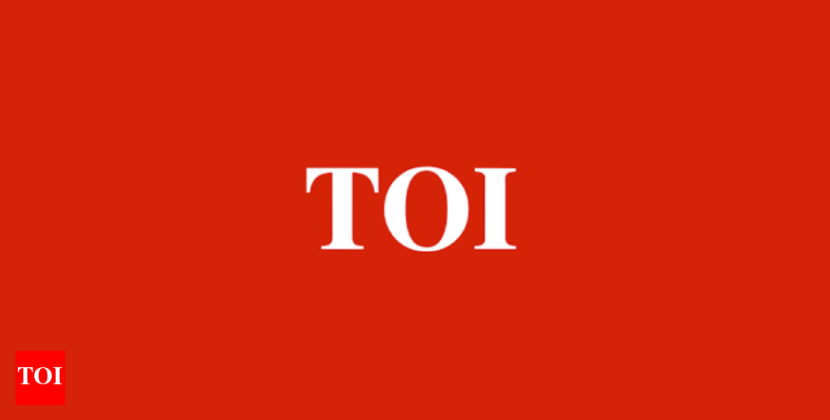
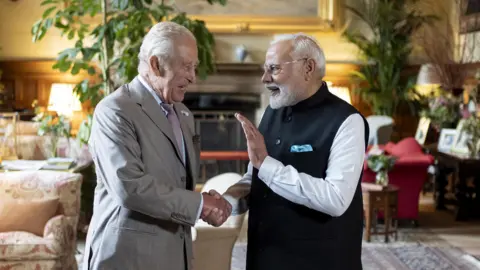 PA Media
PA MediaKing Charles has held talks with Indian Prime Minister Narendra Modi at Sandringham, after a free trade deal was signed between the UK and India.
UK cars and whisky will be cheaper to export to India and Indian textiles and jewellery cheaper to export to the UK under the multi-billion pound export boost.
The deal took three years to reach and also commits to a new India-UK plan to tackle illegal migration.
Modi was hosted by the King at his private estate in Norfolk after meeting Prime Minister Sir Keir Starmer at Chequers, where the agreement was formally signed.
Opponents had warned the deal could undercut British workers due to extended social security terms, but Business Secretary Jonathan Reynolds said this was “completely wrong”.
He added that Indian workers on temporary secondment to the UK would get the same deal already offered to many other countries.
During his visit to Sandringham, Modi gifted Charles a tree to be planted in autumn.
Last year, the Indian prime minister had launched an environmental initiative which encourages people to plant a tree in tribute to their mothers.
Sir Keir said the agreement was “the biggest and most economically significant” trade deal Britain had made since Brexit.
“This deal is now signed, sealed, delivered,” he said.
“The UK has been negotiating a deal like this for many years, but it is this government that got it done, and with it, we’re sending a very powerful message that Britain is open for business, and that is already generating huge confidence.”
The deal will create more than 2,200 British jobs across the country, he said, as Indian firms expand their operations in the UK and British companies secure new business opportunities in India.
Sir Keir also said a trade deal was “not the extent or the limit of our collaboration with India” a country with which the UK has “unique bonds of history, of family and of culture, and we want to strengthen our relationship further”.
Modi hailed what he called “a blueprint for our shared prosperity”.
“On the one hand, Indian textiles, footwear, gems and jewellery, seafood, engineering goods will get better market access in the UK…
“On the other hand, people and industries in India will be able to access products made in the UK, such as medical devices and aerospace parts, at affordable and attractive prices.”
The UK government said the deal – announced in May after years of negotiations – will boost the British economy by £4.8bn a year.
The agreement was approved by the Indian cabinet earlier this week but has not yet been agreed by the UK parliament and is expected to take at least a year to come into effect.
The agreement includes lower tariffs on:
- clothing and shoes
- cars
- food, including frozen prawns
- jewellery and gems
The government also emphasised the benefit to economic growth and job creation from UK firms expanding exports to India.
UK exports that will see levies fall include:
- gin and whisky
- aerospace, electricals and medical devices
- cosmetics
- lamb, salmon, chocolates and biscuits
- luxury cars
The UK already imports £11bn in goods from India but the lower tariffs agreed will make Indian exports cheaper, including for components used in advanced manufacturing.
Indian manufacturers are also expected to gain access to the UK market for electric and hybrid vehicles.
Average tariffs for UK exports to India will drop from 15% to 3%, making it easier for British companies to sell goods in India.
Whisky tariffs for exports to India have been slashed in half, from 150% to 75%, giving the UK an immediate advantage over international competitors in reaching the Indian market, and the tariff will drop to 40% by 2035.
The two prime ministers also agreed on closer collaboration around defence, education, climate, technology and innovation.
Enhanced intelligence sharing and operational collaboration will also assist in tackling corruption, serious fraud, organised crime, and irregular migration.
This includes finalising a new sharing agreement for criminal records, which will assist court proceedings, help maintain accurate watchlists, and enable the enforcement of travel bans.
The deal has not given the UK as much access as it would have liked to India’s financial and legal services industries, and talks continue on a bilateral investment treaty aimed at protecting British investments in India and vice versa.
The two nations also continue to discuss UK plans for a tax on high-carbon industries, which India believes could hit its imports unfairly.
The Indian government welcomed an extended exemption on national insurance contributions, calling this “an unprecedented achievement” when the deal was agreed in May.
The agreement means staff from Indian companies who are temporarily transferred to the UK, and staff from UK firms who are temporarily working in India, will only pay social security contributions in their home country, rather than in both places.
However, the UK government stressed it already has similar reciprocal “double contribution convention” agreements with 17 other countries including the EU, the US and South Korea.
Responding to suggestions the deal meant British workers could be undercut by cheaper Indian workers, Reynolds told BBC Breakfast: “I can categorically tell you that is not the case.
“There is no tax advantage for hiring an Indian worker over a British worker.”
Conservative shadow business secretary Andrew Griffith claimed the trade deal had only been made possible “because of Brexit delivered by the Conservatives” and was “a step in the right direction”.
But he added: “The irony should not be lost on anyone that any gains from this trade deal will be blown out of the water by [Deputy Prime Minister] Angela Rayner’s union charter, stifling business with red tape, the jobs tax and, come autumn, Rachel Reeves’ inevitable tax hikes that will punish Britain’s makers just to reward those who do not contribute.”
However, Liberal Democrat foreign affairs spokesperson Calum Miller said Brexit was what had hindered UK jobs and growth and called for a new UK-EU customs union.
“We support the opening of trade, which is vital in the face of the tariff wars launched by Donald Trump,” he said.
“But the gains from this deal are a small fraction of what the government could deliver for jobs and growth from a better deal with the EU.”


